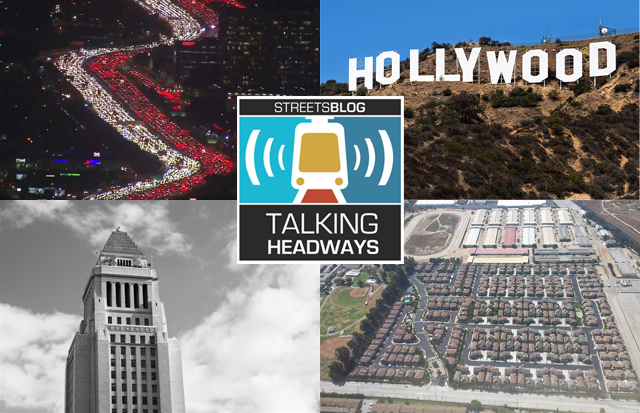This week, we’re joined by Josh Stephens, contributing editor to the California Planning and Development Report about his new book, The Urban Mystique. We had a long conversation about L.A., the availability of bars, opposition urban commentators, and historic propositions that might need an update to stay connected to the times. This is the first part of a two-episode special.
For those of you who prefer to get your news through your ears rather than through your eyes, a partial transcript appears below the audio player:
Jeff Wood: In my mind anyways I think of LA is very noir or maybe that's just like the movies I've seen or when I've been there. It just seems very detective related. Why is that?
Josh Stephens: That's a great question. I'm really interested in urban culture. I think that cities, especially great cities, each have different personalities and those personalities are shaped by history and by demographics and sometimes by landscape and by myth. And for whatever reason, the myth of noir or the aesthetic of noir is part of the LA vernacular. And I see it as an outgrowth of the history of LA where, you know, LA in say 1900s was still considered a new city.
It didn't have so much history, it didn't have institutions. And what it especially did have was a ton of people who came to it from elsewhere, many of whom were looking to reinvent themselves, many of whom had dreams. Some of those dreams involve stardom. Some of those dreams involved wealth. Some of those dreams involved crime, right? And I think there were a lot of stories, the Black Dahlia being one of the most prominent. And I think that the freedom of LA and the newness of LA allowed some dreams to flourish, but it also meant that disappointment flourished.
I think that, you know, we can all imagine the proverbial, you know, want-to-be movie star who gets off the bus or gets off the train and thinks that it's going to be oranges and sunshine and movies immediately. That happens for some people, but not for everyone, not by a long shot. So I think we had a lot of disappointed people in LA in those early years and disappointment breeds, you know, these other types of myths. I think the noir myth is one of them. So we do end up with stories about crime and detectives and trying to figure out what's going on because of this or the freedom that we had here.
And because there weren't sort of the social norms and structures that there might've been back East again, are those good or bad? There are probably both, but certainly in LA, it did have this dark side. And I think that your question is really apt for my book, because LA has always been a place of tension. It has always been seen as a paradise of sunshine, but it also has a dark side. And it's a dark side that I think people don't quite know how to grapple with, especially if you've moved here and you want it to be great and you find out, "Oh, this isn't perfect." Because no place is perfect. And I think that persists today.
I think that for me, growing up, LA is not a great place for kids. It's not a suburban paradise such as it might be where kids do have picket fences and do, you know, make friends with neighborhood kids and play baseball on the street until dusk. But nor is it this truly urbane sophisticated place, the way that in New York or London might be. But I think kids in those cities have very interesting experiences. So LA kind of hovers between being truly cosmopolitan and being kind of suburban and pleasant.
And I think that even today we still have the climate. We still have the landscape. Those are all wonderful things, but we're also a place of strife. We have racial strife, goodness knows. You know, we have socioeconomic strife. LA is an incredibly expensive place and we are wedded to the automobile and that involves sitting in traffic. So we might come here for the weather, but we're stuck here in traffic. And I think those tensions about things that are great about LA and I would extend that to other parts of the Southern California as well. We have things that are great about our region and then we have things that are not so great.
And I think that we are constantly trying to reckon with that. And as an urban planner, again, my question is how can we really make it better? How can we really address what is good and bad about Southern California and try to accentuate the good for the most number of people, especially disadvantaged people and how do we diminish the bad? And I think there are many political forces that leave that discussion in stasis to a point. So we don't have detectives, you know, wearing fedoras skulking around anymore, or maybe we do. I don't know. We do still have this tension between what's good and bad and we haven't quite broken through.
And as a civic culture decided what good is, and we haven't committed ourselves to achieving that good just yet, as far as I'm concerned. So I think that in many respects is the current civic culture of LA is that we're resigned to some of these bad things. We make incremental changes, but we're still struggling.






